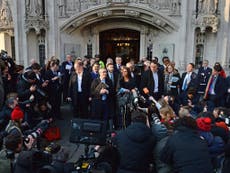Brexit: what we know now – and what we still need to know
What does today's Supreme Court decision mean for the chances of stopping Brexit? Our Chief Political Commentator answers your questions


Does the Supreme Court decision mean there’s more chance of stopping or at least delaying Brexit?
No. The Court said the Government must pass an Act of Parliament before starting the Article 50 process of leaving the EU. That will almost certainly happen well before the end of March, which is when Theresa May wanted to invoke Article 50 anyway.
Are you sure? I thought Labour said Theresa May can't have a blank cheque?
Jeremy Corbyn and Keir Starmer, the shadow Brexit secretary, have said that, but they have also said they won’t block Article 50. They will table amendments to the Bill to try to limit the Government’s room for manoeuvre in the Brexit negotiations during the two-year period set out in Article 50, but they won’t try to delay the start of the those talks.
What are Labour’s demands?
Matthew Pennycook, a member of Labour's shadow Brexit team, has set out its possible amendments. Labour wants the Government to publish a plan, which Theresa May says she has done, in the form of her speech last week. Labour may demand a White Paper, an official Government policy document, a demand supported by several anti-Brexit Conservative MPs. But it doesn’t matter much.
Labour wants to insist on “barrier-free access to the single market”, although May said last week that she wanted tariff-free access to the single market. Neither of them say what they want to do if they can’t get it.
Labour wants to guarantee the rights of EU citizens in this country before the rest of the talks begin. The Government will refuse because other EU countries may insist that nothing is agreed until everything is agreed. Finally, Starmer wants to require the Government to put the final Brexit deal to a vote of Parliament in time to allow for further negotiations. The Government probably won’t want to restrict its timetable in that way.
What about the House of Lords though? Isn't it stuffed with pro-EU Lib Dems and crossbenchers?
There are a lot of Remainers in the House of Lords, but the two main parties, the Conservatives and Labour, support triggering Article 50 by the end of March. With a clear majority in the Upper House, the two front benches will be able to stop any delaying tactics.
So what was the point of that expensive court case?
Good question. It was, in the end, more about clarifying a point of legal principle, namely the limits of the power of the executive (the government) over the legislature (parliament). It also dealt with the question of whether the Scottish Parliament or Northern Ireland Assembly had a veto over Article 50. They don’t.
What happens after Article 50 is triggered?
The Brexit talks begin. Michel Barnier, the EU's chief negotiator, has said he wants to get them wrapped up by October 2018 to allow plenty of time for EU countries to ratify the agreement in time for Britain to leave at the end of March 2019.
What about the other court case in Dublin?
There is a case in the Irish courts which is trying to find out whether a country that has started the Article 50 process can change its mind. This wasn’t dealt with by the UK Supreme Court, but the plan is to take the case from Ireland to the Court of Justice of the European Union. If Article 50 is reversible, it may affect the Brexit negotiations, but probably not to the UK’s advantage: it may give the other EU countries an incentive to offer us a bad deal in the hope that we change our minds.
What if it becomes clear that the Brexit deal would be very bad for the economy?
This is the last hope for the “hard Remainers”: that public opinion in Britain would start to swing decisively against Brexit when the details are clear. Ben Chu, The Independent’s economics editor, and Andrew Grice, my fellow columnist, think this is a possibility. I personally think it is unlikely, because, although I think Brexit will damage the British economy, I don’t think most people who voted to leave will recognise that until after we have actually left.
Even if people do change their minds, the trouble with planning for it now is that it looks like a refusal to accept the result of the 2016 referendum.



Join our commenting forum
Join thought-provoking conversations, follow other Independent readers and see their replies